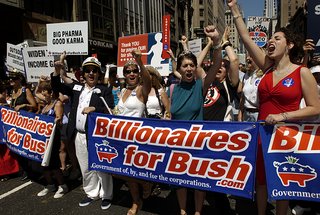A Rising Tide Lifts All Yachts
 The LA Times had a very good analysis of the current economic situation, and the seeming disconnect between statistics and perception. Statistically speaking, our economy is doing quite well. Corporate profits and growth are up.
The LA Times had a very good analysis of the current economic situation, and the seeming disconnect between statistics and perception. Statistically speaking, our economy is doing quite well. Corporate profits and growth are up.From January through March, the economy shot forward, growing by 4.8% — the largest increase in nearly three years and a stunningly rapid recovery after the previous quarter's Katrina-dampened 1.7%.But poll after poll shows that Americans haven't internalized this "good News". Why?
Strangely, though, the public doesn't seem to be listening. Americans are more than twice as likely to give pollsters a negative assessment of the economy as a positive one — 64% disapprove of Bush's handling of the economy. It's strange. The macroeconomic numbers are decidedly robust, but the public remains determinedly glum.And it's not just the poor who are affected. The middle class has not benefited from the booming economy either.
If you dig a bit deeper than the base growth statistics, though, the picture clarifies considerably. Our economy has grown so starkly unequal that the statistician's view now says surprisingly little about the average American's experience. Last quarter may have seen 4.8% growth, but hidden in those numbers was a depressing factoid: Wages had only grown 0.7% — slower than housing, health or gasoline costs.
That's been the story of the last few years, a rising tide that lifts only yachts. It used to be that economic growth ensured wide benefits across society. But the last four years of economic expansion have been historic for the steadily increasing poverty rate — a depressing sign that inequality has so split the poor from the rich that the two hardly inhabit the same economy.
Research released last week by Tom Hertz of American University raised the troubling notion that inequality and economic insecurity have advanced so rapidly that the economic expansion of 2003 and 2004 was, in a variety of important ways, no better for the median American than the recession of 1990-91.Read that again, and think about it. Americans, average Americans, are doing as well (or as poorly) as they did during the ECONOMIC RECESSION of 1990-91. (Remember that one? The one that got Bush pere an early retirement?) The Rich got richer, and the rest of us.......well, do the numbers.
....From 1990 to 1991, 13% of households saw their income decline by $20,000 or more in real terms. In 2003-04, it was 16.6%. And the difference didn't come in steep falls for the rich; rather, the top income quintile saw a reduction in negative income mobility......As for good ol' upward mobility, the median household was no more likely to move up the economic ladder during the 2003-04 expansion than it was during the 1990-91 recession. Think about that for a second — the average household's income was just as likely to increase during the last severe recession as the latest expansion. For most, the good times now are little better than the bad.
And consider these numbers:
Health costs have increased almost 75% since 2000. And, according to a just-released study by the Commonwealth Fund, lack of insurance has become a decidedly working-class problem, with nearly 70% of the 49 million uninsured hailing from a family with at least one full-time worker.No wonder the billionaires love Bush!
Add in gasoline that's merrily creeping right past the $3.50-a-gallon mark, and a scorchingly hot housing market, and it's no wonder Gallup's "worry index" — a poll tracking public fears on seven economic issues — has recorded its highest-ever reading, marking us as the most economically anxious public since its inception six years ago.
The economy, despite what some economists and politicians think, isn't an abstraction, it's an experience. And the average American isn't experiencing 4.8% growth; he's experiencing increased income insecurity, wages lagging behind prices and deteriorating health benefits. Strong as the growth might be, a strong economy isn't much good if it's using those biceps to pummel the working class.



0 Comments:
Post a Comment
<< Home